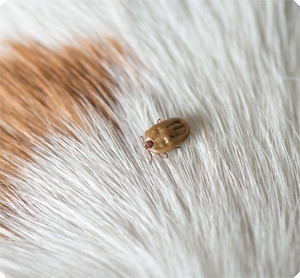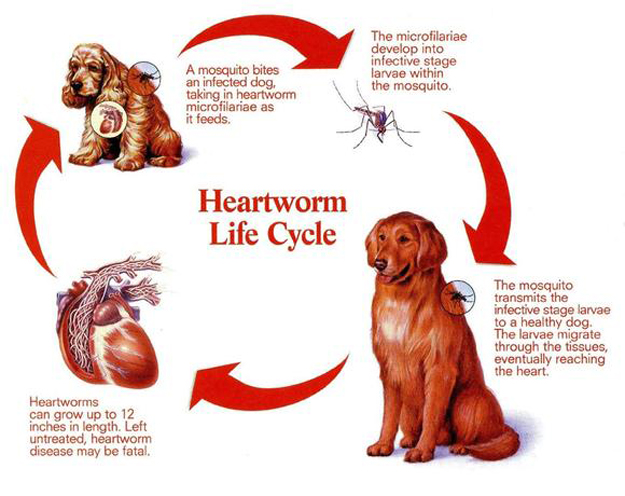PARASITE CONTROL
|
 Fleas & Ticks Fleas & Ticks
- Flea & Tick control is necessary for all pets - because external parasites can be very harmful to their health.
- Fleas carry tapeworms (intestinal parasite) and can trigger allergic reactions that can cause skin infections.
- Ticks carry many diseases. The most common one we see in this area is Lyme disease.
- It is necessary to treat ALL pets in your household - as well as the environment.
- 2 fleas in contact with an untreated pet can become 200,000 in 2 months.
- 95% of fleas live in your pet's environment.
- Your pet can pick up ticks from walking through tall grass and wooded areas.
|
|
We carry many products to prevent Fleas & Ticks on your pet and in your environment. Please ask us for the best product for your pet.
|
Fecal Parasites
|
Coccidia
Coccidia are microscopic parasites that live within cells of the intestinal lining. Your pet can become infected with coccidia by eating contaminated soil or feces.
Coccidia may cause watery and even blood tinged diarrhea. It is most commonly seen in puppies and kittens, but can also be seen in adult animals as well. Coccidia is a protozoa (single celled organism) not a "worm"; therefore, the treatment for coccdia is with a course of antibiotics instead of a dewormer. Other treatment may be necessary if the pet is having diarrhea or is dehydrated.
|
|
|
Hookworms
Hookworms are an intestinal parasite that live in the lining of the small intestine and feed on blood. They can cause diarrhea and anemia (decreased red blood cell count). Hookworm eggs are passed in the feces of an infected animal. The eggs then mature in the environment into larvae. The larvae live in the soil surface and grass where they are either eaten by pets or penetrate the animal's skin, usually between the toes. Puppies and kittens can also become infected by hookworm larvae that are passed through their mother's milk. The treatment for hookworms is multiple dewormings 2-3 weeks apart.
|
|
|
Eggs can remain contagious in the soil for years, so contaminated ground becomes a good source of reinfection. After your pet's initial treatment it is necessary to keep them on a good parasite prevention regimen.
- Dogs should be on a monthly parasite prevention such as Heartgard or Interceptor year round.
- Cats that go outside, or are hunters, should be routinely dewormed throughout the year, ideally every 3-4 months.
- For all pets yearly stool samples should be done to screen for intestinal parasites.
Hookworms are zoonotic (can be transmitted to people). So it is necessary to practice good hygiene as well as having your pet(s) on a good parasite prevention; especially if there are young children in the home.
|
|
Roundworms
Roundworms are one of the most common intestinal parasites of dogs and cats. Pets can become infected by swallowing roundworm eggs in contaminated soil and feces or through hunting rodents, birds and certain insects. Puppies and kittens are commonly infected by their mother while still in the uterus. The treatment for roundworms is two dewormings 2-3 weeks apart.
Eggs can remain contagious in the soil for years, so contaminated ground becomes a good source of reinfection. After your pet's initial treatment it is necessary to keep them on a good parasite prevention regimen.
|
- Dogs should be on a monthly parasite prevention such as Heartgard or Trifexis year round.
- Cats that go outside, or are hunters, should be routinely dewormed throughout the year, ideally every 3-4 months.
- For all pets yearly stool samples should be done to screen for intestinal parasites.
Roundworms are zoonotic (can be transmitted to people). So it is necessary to practice good hygiene as well as having your pet(s) on a good parasite prevention; especially if there are young children in the home.
|
|
Tapeworms
Tapeworms are a parasitic worm found in the intestines of dogs and cats. Tapeworm segments are shed in the feces, leaving the head still attached to produce new segments. These "segments" are visible and can be seen in your pet's feces, clinging to the hair around the anal area or in your pet's bedding. Live tapeworm segments are white, about 1/4 inch long and may expand and contract. Dry tapeworm segments may resemble cucumber seeds, sesame seeds or rice.
Tapeworms can produce digestive upset, variation in appetite, poor hair coat and skin, weight loss and signs or abdominal discomfort.
Tapeworms can be carried by fleas. It is necessary to make sure that your pet, and any other pet's in the household, are treated monthly with a safe and effective prescription flea product. Ask your veterinarian what product they recommend for your pet. This will protect them against flea infestation as well as re-infection of tapeworms.
Tapeworms are also carried by small rodents. This poses a risk of infection to pet's that hunt mice and other small rodents outside. Those pet's that are avid hunters should be strategically dewormed every 3-4 months.
|
|
Whipworms
Pets can become infected by swallowing whipworm eggs found in contaminated soil or feces. Whipworms live in the cecum and colon or your dog's intestines and can cause severe irritation to these organs. This may result in watery, bloody diarrhea, and/or weight loss. The treatment for whipworms entails multiple dewormings to ensure that we get the entire life cycle of the parasite.
A dog that is infected with whipworms passes microscopic eggs in their stool. These eggs are very hardy and can live in the environment for long periods of time, even through the winter. Whipworm eggs mature and are able to reinfect your dog in 10-60 days. This makes it possible for your pet to become infected with whipworms again in the future.
For this reason it is necessary to:
- Treat the current whipworm infection with medication that was dispensed today.
- Start your dog and any other dog's in the household on a monthly parasite prevention called Trifexis.
- Pick up your pet's stools after he/she goes to the bathroom. This will help to decrease the amount of contamination in your pet's environment.
- Perform early stool samples to screen for intestinal parasites.
|
Blood Parasites
|
Heartworm/Lyme Test
- Screens for exposure to heartworm parasite, which is transmitted by mosquitoes
- Screens for exposure to 3 tick borne diseases: lyme, erlichia and anaplasma
- Testing is required annually
- Early detection of these diseases is crucial to successful treatment
|
|

|
|
Heartworm & Intestinal Parasite Prevention
-
It is necessary to have your dog on a monthly heartworm and intestinal parasite prevention
-
The heartworm parasite is transmitted by mosquitoes and is a life threatening blood parasite
-
Your pet can pick up intestinal parasites from their environment through fecal contamination
-
Intestinal parasites can cause vomiting/diarrhea as well as a general unthrifty appearance
-
Many intestinal parasites are zoonotic (can be spread to people)
-
Cats that go outside or are hunters should be dewormed every 3-4 months
-
It is necessary to check a stool sample for intestinal parasites yearly
|
|